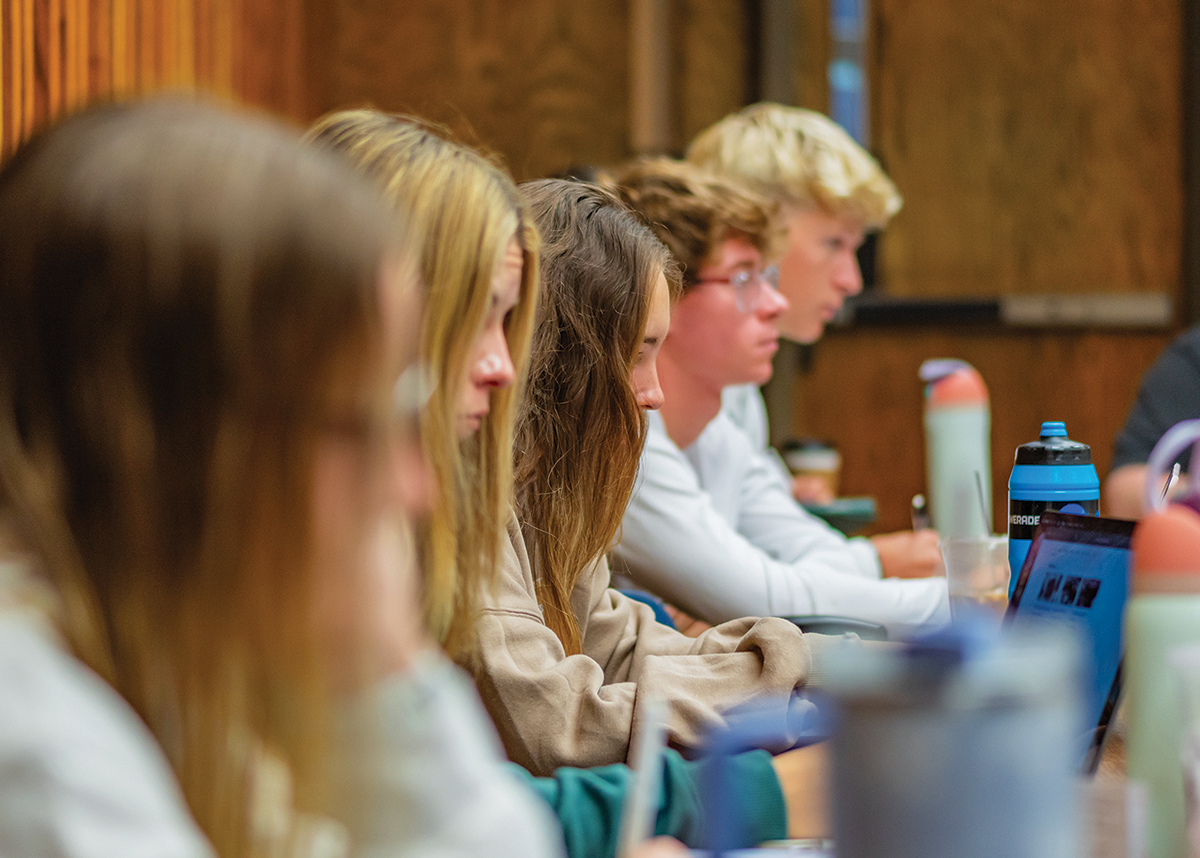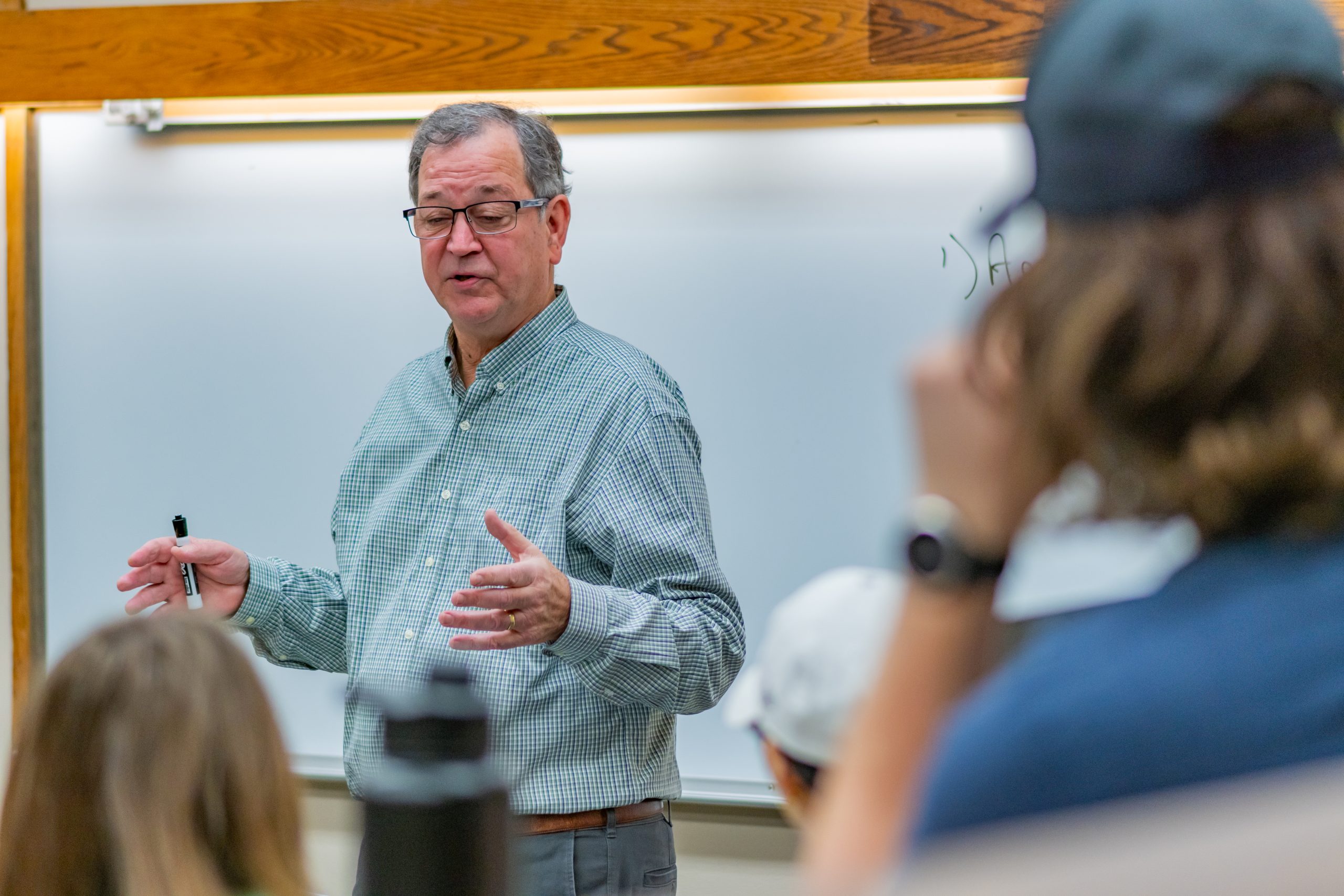From The Ichabod – Winter 2025
Story Annie Flachsbarth • Photos Jeremy Wangler
In an unprecedented surge, Washburn University’s School of Business has shattered enrollment records, marking a 50 percent increase with 605 business students for the fall 2024 semester – up from 400 students at the department’s lowest point during the COVID-19 pandemic. This dramatic rise comes as part of a broader university trend, with Washburn celebrating its largest freshman class in its 159 years, with an impressive 27 percent boost in new high school graduates and first-time college students.
As these numbers climb, the story behind this explosive growth reveals a series of strategic maneuvers that are redefining the university’s future – fueling student engagement and an educational renaissance.
While Washburn has long been known for its strong emphasis on providing a quality education, enhanced recruitment strategies have been key drivers in recent enrollment increases. Increased financial assistance offerings through Washburn’s Together We Thrive financial aid package have strengthened the school’s connection with prospective students. According to David Sollars, dean, School of Business, business students are positioned to receive even more financial support.
“We hand out an additional $500,000 a year in scholarships just from the business school,” Sollars said. “Our alumni continue to give, which makes it easier to help make it financially viable to get an education in business.”
Other changes, such as introducing learning options in undergraduate and master’s programs – including more online classes and a flex option for remote participation – have allowed the school to expand its reach beyond geographical constraints. These changes help meet the needs of a diverse student population and have benefited both traditional and non-traditional students. Sollars said average student demographics have changed, with more students entering MBA programs directly after obtaining undergraduate degrees instead of returning to school after several years in the workforce.
“When I came to Washburn 22 years ago, we had significantly more night classes and a much larger non-traditional student group. That’s flipped dramatically in recent years,” Sollars said.
As the business landscape evolves, Washburn’s curriculum remains agile, integrating emerging fields like artificial intelligence to prepare students for the future. This forward-thinking approach positions Washburn as a leader in business education, adapting to the industry’s changing demands.
Additionally, the School of Business’ commitment to maintaining its prestigious accreditation with the AACSB is central to its ongoing success. This is primarily attributed to the dedicated faculty who foster small class sizes, allowing for personalized mentorship with students and practical, hands-on learning experiences.
While Sollars and the university plan to continue this growth within the School of Business, Sollars said enrollment can’t exceed the growth of other resources like faculty and facilities to be sustainable. They can’t accommodate the class sizes large state schools may have, and they don’t want to.
“Our average class size is still in the upper 20s,” Sollars said. “Smaller classes allow the faculty to get to know the students, making internship and placement recommendations much easier.”

One of the biggest draws for students to Washburn’s School of Business is the availability of high-quality internships and job opportunities in the capital city. According to Jim Martin, bba ’79, former Westar vice president of finance and the Henrietta and G.W. Snyder Jr. Professor in Business, Topeka employers contact him weekly looking for student workers.
“We have more internships in the area than we can fill,” Martin said. “Manhattan and Lawrence are great towns, but that’s not where you go for an internship – you come to Topeka.”
This demand from local businesses for skilled, well-rounded graduates enhances the school’s appeal and ensures students can seamlessly transition from academia to successful careers.
“There is a high demand for graduates with technology skills, with an emphasis on people skills such as communication and teamwork,” Martin said. “For example, employers don’t just want bean counters in accounting. They want well-rounded students with analytical minds to help advance their missions.”

In 2025, a $40 million renovation project to Henderson Learning Resources Center, home to the School of Business, is poised to revolutionize the facility and encourage additional departmental growth. The renovations will upgrade the building with cutting-edge technology and enhanced study spaces, offering students a state-of-the-art learning environment that meets contemporary educational demands.
As Washburn continues to expand, this upgraded facility, known as Advisors Excel Hall, will be instrumental in sustaining its appeal and competitive edge.
“College education is a big investment. You want to know it will pay off at the end,” Sollars said. “The focus will always be on providing students all the opportunities and resources we can.”
1700 SW College Ave., Topeka, KS 66621
785.670.4483
contactus@wualumni.org
Copyrights © 2025 Washburn University Alumni Association and Foundation. All rights reserved. Privacy Policy